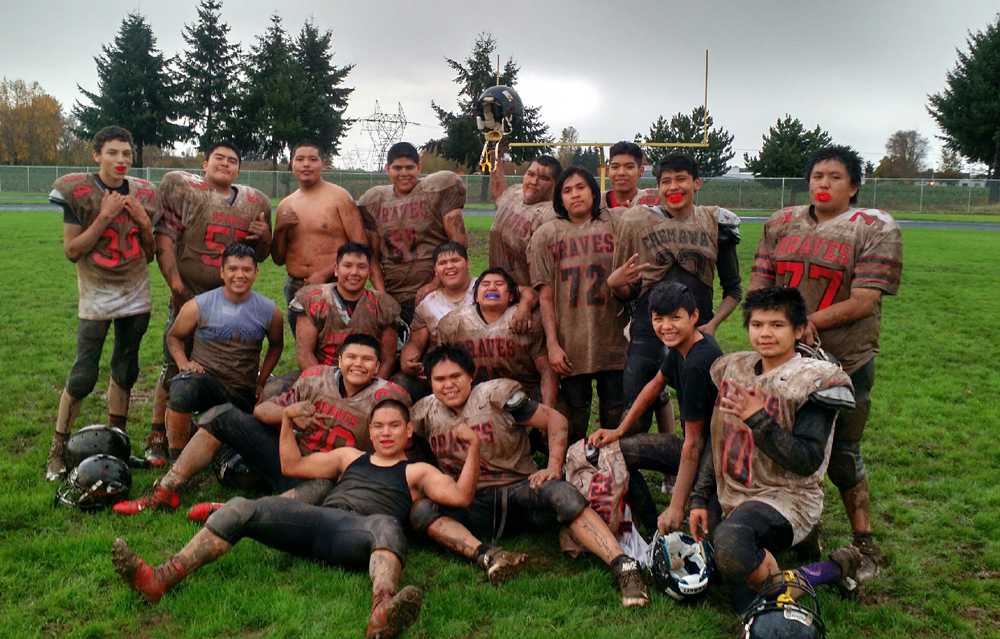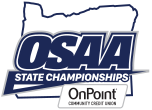
[Editor’s note: The idea behind “Alphabet Stories” is to write one noteworthy athletics-related story about each OSAA-member school. We started with Adrian HS on Sept.18. Today’s story, precisely four months later, is about Chemawa Indian School. The goal will be to write two per week. While we will be relying upon athletic directors to furnish story ideas, anyone may offer suggestions by emailing [email protected]]
The scoreboard has not been kind to the football team at Chemawa Indian School. In 2016, playing a varsity schedule, the Salem school gave up 378 points in seven games without scoring a single point itself.
Over the past 10 varsity seasons, Chemawa has endured six winless seasons. Three other years the team won only once.
It takes a special kind of kid to put on the helmet and shoulder pads on game day, week after week, year after year, knowing what’s likely to happen over the next 48 minutes.
Perhaps that’s why Chemawa’s nickname is the Braves.
It’s easy to play on a team that’s always successful. It’s much harder to play on a team that rarely is. You have to have courage, determination, grit…you have to be brave. THE Braves.
“That’s us,” said head coach Steve Crane. “We will always be a group of kids that keeps coming regardless of the score. That will always be Chemawa football as long as I’m involved.
***
Chemawa Indian School opened its doors in 1880 as a government-run boarding school for Native American students. Kids come from tribal communities all across the Western United States. Some come because their tribes don’t have high schools. Others come because of tradition. Still others have come for a fresh start, because they’ve gotten into trouble or haven’t been successful in their home environments. From this disparate group, Crane must find a football team every year.
Chemawa has been playing organized football since 1894. Crane has been involved for nine years, the past seven as head coach of the Braves. The 2A school has about 250 students, male and female, in grades 9-12. Some come for just one year. Establishing continuity in an athletic program is next to impossible.
“We don’t know what we have until the kids get off the bus,” Crane said.
Crane stands up on the first day at introductions and tells the students that Chemawa has a football team.
“’Come on out,’” he encourages. “You can hit people and not get in trouble.”
Each year, a decent number of boys are interested. The challenge is getting them in uniform for games. Because most kids are coming for a fresh start, many, because of academic credit deficiencies, are ineligible to compete. Others have no background in football whatsoever.
“I had a kid ask me once after a game, ‘Is it okay to tackle the guy with the ball?’” Crane explained. “When I said, ‘Yes,’ he answered, ‘We have to work on that.’”
Then there’s the timing of the fall season. Because the students fly in over Labor Day Weekend, Chemawa starts football several weeks behind from the outset. A team needs a minimum of 10 practices before it can play officially. Most years, the Braves meet that requirement the day before their first game.
***
Crane said that the players know what they’re getting into every year. They see the size disparities and the inequities in practice time and experience. They just want to play, even if the scoreboard isn’t their friend.
“I am super competitive, so it frustrates me,” Crane admitted. “We talk about controlling attitude and effort. Moral victories sounds so weak, but we look for what we can do well. Getting beat but not broken. Giving good effort. Playing as hard as we can. We may lose but we are not the losers.”
Crane told the story of Clayland Lewis, a lineman from a tribe in Arizona. After a game, he asked the coaching staff if he could talk to the player he lined up against that night.
“Thank you for kicking my ass,” he told his opponent. “I will use this to get better.”
By the time Lewis was a senior, he knew how to block, Crane said.
After the 2016 season, which capped a four-year stretch in which Chemawa won just one game, NFL Films reached out to the school. They were surprised that the Braves were still going to play the following season and decided to do a piece on them (https://www.youtube.com/watch?v=0O5c4S66ToA).
Of course they were going to play! This is Chemawa Indian School, home of the Braves! They play for the challenge. They play for food from McDonald’s on road trips. They play to grow into football players who have their shoulder pads on backwards one week and are starting and making plays the next. They play to be one tribe.
“We may not win on the scoreboard, but we preach, ‘Make sure they feel it,’” Crane said. “’Make sure they know they played with you.’”
Added Crane: “The part I like best is when games are over and they’re going through the high five line, saying ‘good game’ looking them in the eye. Then they lie down. Exhausted. They gave everything they had. There’s a pride there that they gave it all. They did everything we asked them to do. Those are the moments that keep me going.”










